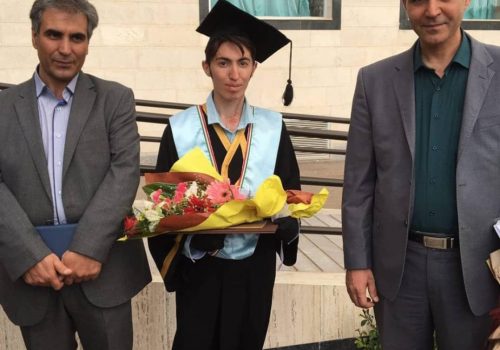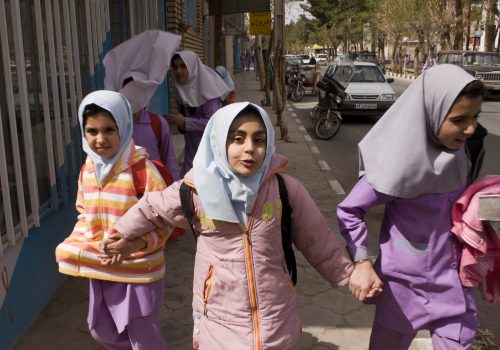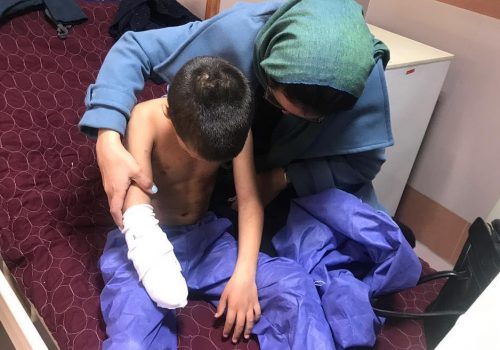Coronavirus pandemic exacerbates Iran’s child abuse problem
In late April, a 10-year-old boy landed in an emergency room with severe eye injuries caused by a violent outburst from his father. Arash had refused to help his family with “waste picking”—an activity undertaken by slum-dwellers to salvage recyclable materials for resale or personal use—out of fear of contracting COVID-19.
“The child was beaten for hours before a local nongovernmental organization (NGO) intervened. The father was in such a state of rage that even the neighbors feared to interfere—and all this happened in Tehran,” an aid worker said on condition of anonymity.
When Arash’s mother tried to help him flee the house, her husband locked up the boy in the bathroom and then redirected his anger at her, throwing her out of their home along with their two other children. Standing alone on a rainy Tehran evening with children and nowhere to go, she turned to the government-run Social Emergency Coordination Center. After twenty tries, the understaffed center’s operator finally answered and informed her that they would only send support if the “child’s life was in real danger.”
Arash’s story is one of many cases of a growing domestic abuse crisis in Iran amidst the coronavirus pandemic. Iran was under lockdown from mid-March to mid-April and, despite reopenings and the government extending loans to businesses, many Iranians are out of jobs and have been forced to stay at home. The Statistical Center of Iran claims that COVID-19 had made 1.5 million people unemployed as of June 21, while the Iran Parliament Research Center reports that the viral outbreak has put up to 6.4 million other jobs on the line. According to experts, the financial meltdown coupled with the mental burden of the pandemic has exacerbated Iran’s child abuse and violence against women problem.
The issue of domestic violence increasing during the pandemic is not unique to Iran, but a universal outcome of the viral outbreak. Over a dozen women have been murdered since coronavirus protections began in Turkey—some of the cases described as honor killings have given birth to a social media campaign using the hashtag #ChallengeAccepted. Iraq and Lebanon have also reported a sharp surge in cases. The United Nations (UN) warns conditions are certainly worse for displaced and refugee children in countries like Syria and Yemen.
As with many other countries in the region, Iran’s impoverished children have long been a fixture on city streets; begging, waste picking, or selling products such as gum and flowers to earn what they can. Their presence, however, is considered a public health hazard by some Iranians hard-hit by pandemic-induced anxiety.
Residents of a downtown Tehran neighborhood contacted municipality officials in mid-April with a brisk request: “Round up child beggars and waste pickers. They are spreading corona.” The Tehran Municipality apprehended six children and managed to contact an aid worker. A few hours later, the aid worker found the children locked up in the municipality’s basement bruised and bloodied.
Over 4,700 children are engaged in waste picking in Tehran. Authorities have launched an initiative for “collecting street children,” tying the operation to the fight against the cornavirus outbreak, though the “operation” was used to extradite 380 Afghan child waste pickers from Iran. Former MP Fatemeh Zolghadr has criticized the move as “an infringement of the UN Convention on the Rights of the Child.”
Subscribe for more from IranSource
Sign up for the IranSource newsletter, which provides a holistic look at Iran’s internal dynamics, global and regional policies, and posture through unique analysis of current events and long-term, strategic issues related to Iran.
When home is not safe
The Iran Welfare Organization (IWO), a state agency tasked with women and children’s affairs, has repeatedly warned of a sharp surge in domestic violence amid the pandemic, as people are encouraged to stay home. An article in the Tehran daily, Hamshari, speculated that the number of child abuse cases has grown by five times since the coronavirus pandemic began.
The organization has yet to release nationwide statistics detailing the situation, but regional IWO managers have been outspoken in their efforts to raise awareness about the crisis.
Mohsen Marvi, the head of the IWO office in the northeastern city of Mashhad, says, “During the first four months of the outbreak in Iran, 1,932 child abuse cases were reported in Mashhad—an eight-fold increase compared to a year earlier.” He added that domestic violence cases, including elderly and disability abuse, have also surged. IWO’s hotlines in Mashhad received 32,141 emergency calls in four months alone—a thirty-fold increase. During that period, emergency teams had to be dispatched 612 times.
Marvi is of the opinion that people have been confined together in close quarters for too long during the pandemic. Lack of healthy communication and parenting skills, coupled with a sense of unknowing and fear during the outbreak, have increased stress and tensions at home. He highlights the importance of educating Iranians about domestic violence and child abuse while emphasizing that a lack of funding has impaired efforts to do so.
Although there is no exact statistic on the number of cases throughout the country, testimonies from civil society organizations also confirm this worrying trend.
One social worker wrote in a blog post: “Few days ago, I received a phone call from Malihe, a mother supported by a local NGO. I just hear sobbing, no words. I tell her to calm down and speak. ‘I beg you, ma’am, get us out of here. If it was not for my kids I would have killed myself.’ Asking her to calm down, I promised her help, knowing that not much can be done.”
According to the social worker, the 28-year-old mother of three lives with her husband who is dealing with unemployment, drug addiction, and a history of violence. The pandemic had left her unemployed as well, leaving her dependent on a depleting pot of savings. Worse, she was forced to spend more time at home with her violent husband who was subjecting her to more domestic violence. Even if Malihe braved the legal costs of divorce, she would end up leaving her children at the hands of an abusive addict, since Iran’s divorce courts favor men in custody cases.
Child rights advocates have long pushed Iranian authorities to adopt a more robust domestic violence law that would provide social workers with some much-needed leeway to better protect victims and deter possible abusers. On June 7, the Guardian Council—an un-elected body responsible for the oversight of laws and orders by parliament—ratified a bill into law to protect children and adolescents in Iran. The law was a watered-down version of a bill that had been in the making since 2009, but only passed after a tragic honor killing had shocked the nation. Child rights advocates have called the law discriminatory and exclusive despite being holistic.
The new normal
Coronavirus is becoming the new normal for some families. One mother noted: “Early into the pandemic, tensions were boiling at our home. My four-year-old daughter regularly got on my nerves and many times I resorted to physical punishment to rein her in. But we have adapted to life with corona. She’s a child. She gets naughty. She keeps nagging at me when [she’s] bored from staying indoors. I can’t beat her every time.”
Iranian psychologist, Fatemeh Ghasemzadeh, is a senior member of Iranian NGO Pooya Educational Research Society, which has organized online classes for families on how to deal with problems and tensions created by the pandemic. “We specially focus on how to keep children entertained at home while teaching parents healthy communication skills.”
Ghasemzadeh notes that tensions have been simmering especially in poor families, like that of Arash, who are cramped in close quarters and face a bleak economic outlook.
Having nowhere else to go, Arash, along with his mother and siblings, returned home a few days after the incident. The whole family is once again engaged in waste picking.
The aid worker familiar with the case says that a local NGO has offered Arash’s mother aid. “They are helping her explore her options while extending some financial aid. But [Arash’s mother] doesn’t have too many options—getting a divorce, leaving her husband, staying and putting up with the bursts of anger and violence—and she is well aware of that. Everyone, including the children, know that not much can be done.”
Khosro Sayeh Isfahani is a Tehran-based journalist with a focus on politics and technology. Follow him on Twitter: @KhosroKalbasi.
Image: Children with sacks on their back for wastepicking via IRNA


